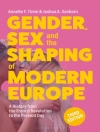Germany’s acceptance of its direct responsibility for the Holocaust has strengthened its relationship with Israel and has led to a deep commitment to combat antisemitism and rebuild Jewish life in Germany. As we draw close to a time when there will be no more firsthand experience of the horrors of the Holocaust, there is great concern about what will happen when German responsibility turns into history. Will the present taboo against open antisemitism be lifted as collective memory fades? There are alarming signs of the rise of the far right, which includes blatantly antisemitic elements, already visible in public discourse. The evidence is unmistakable—overt antisemitism is dramatically increasing once more.
The Future of the German-Jewish Past deals with the formidable challenges created by these developments. It is conceptualized to offer a variety of perspectives and views on the question of the future of the German-Jewish past. The volume addresses topics such as antisemitism, Holocaust memory, historiography, and political issues relating to the future relationship between Jews, Israel, and Germany. While the central focus of this volume is Germany, the implications go beyond the German-Jewish experience and relate to some of the broader challenges facing modern societies today.
Daftar Isi
Acknowledgments
The Future of the German-Jewish Past Starts Here, by Gideon Reuveni
THE PERSONAL, THE HISTORICAL, AND THE MAKING OF GERMAN-JEWISH MEMORY
“No More Mr. Nice Guy”: Questioning the Ideal of Assimilation, by Alan Posener
Generation in Flux: Diasporic Reflections on the Future of German-Jewishness, by Sheer Ganor
Home on the Balcony: New Initiatives for the Preservation of Documents and Material Objects Relating to German-Jewish History, by Joachim Schlör
From Object to Subject: Representing Jews and Jewishness at the Jewish Museum Berlin, by Michal Friedlander
Past Imperfect, Future Tense: A Mother’s Letter about Loss, Storytelling, and the Profound Ambivalence of the German-Jewish Legacy, by Nicola Glucksmann
LOOKING BACK TO FUTURE VISIONS OF THE GERMAN-JEWISH PAST
The Ever-Dying Jewry? Prophets of Doom and the Survival of European Jewry, by Michael Brenner
The Thin Crust of Civilization: Lessons from the German-Jewish Past, by Mathias Berek
The Dialectics of Tradition: German-Jewish Studies and the Future, by Galili Shahar
“Noch ist unsere Hoffnung nicht dahin!” Fritz Pinkuss’s View on Germans, Jews, and the Universal Value of the German-Jewish Past, by Björn Siegel
GERMAN-JEWISHNESS AND DIFFERENCE
On the Possibilities and Impossibilities of Being Jewish in Postwar Germany, by Sandra Anusiewicz-Baer
Jewish Studies without the “Other”, by Klaus Hödl
Rethinking Jews, Antisemitism, and Jewish Difference in Postwar Germany, by Lisa Silverman
Newspaper Feuilletons: Reflections on the Possibilities of German-Jewish Authorship and Literature, by Liliane Weissberg
THE GERMAN-ISRAELI COMPLEX
Navigating Mythical Time: Israeli Jewish Migrants and the Identity Play of Mirrors, by Dani Kranz
“The Sun Does Not Shine, It Radiates”: On National(ist) Mergings in German Philosemitic Imagery of Tel Aviv, by Hannah C. Tzuberi
Does the German-Jewish Past Have a Future in Israel?, by Moshe Zimmermann
NEW PERSPECTIVES FOR GERMAN-JEWISH STUDIES
The Psychology of Antisemitism Revisited, by Anthony D. Kauders
Jewish and German: The Leo Baeck Institute Archives and Library, by Frank Mecklenburg
Toward a Transnational Jewish Historiography: Reflections on a Possible Future Path for the German-Jewish Past, by Guy Miron
Digital German-Jewish Futures: Experiential Learning, Activism, and Entertainment, by Kerry Wallach
Contributors
Index
Tentang Penulis
Gideon Reuveni is the acting director of the Weidenfeld Institute of Jewish Studies and the Centre for German-Jewish Studies at the University of Sussex. His central research and teaching interests are the cultural and social history of modern European, Jewish history and the Holocaust. Reuveni has published widely on diverse topics such as historiography, sports, reading culture, and Jewish economic history. His most recent book is Consumer Culture and the Making of Modern Jewish Identity, which won the 2018 National Jewish Book Award in Modern Jewish Thought and Experience.
Diana Franklin is manager of the Centre for German-Jewish Studies at the University of Sussex. She has worked at the centre since it was founded in 1995 by Edward Timms. Franklin’s background as a second-generation German-Jewish immigrant to the United Kingdom informs her ideas about the place of relationships of refugees to their host societies.












